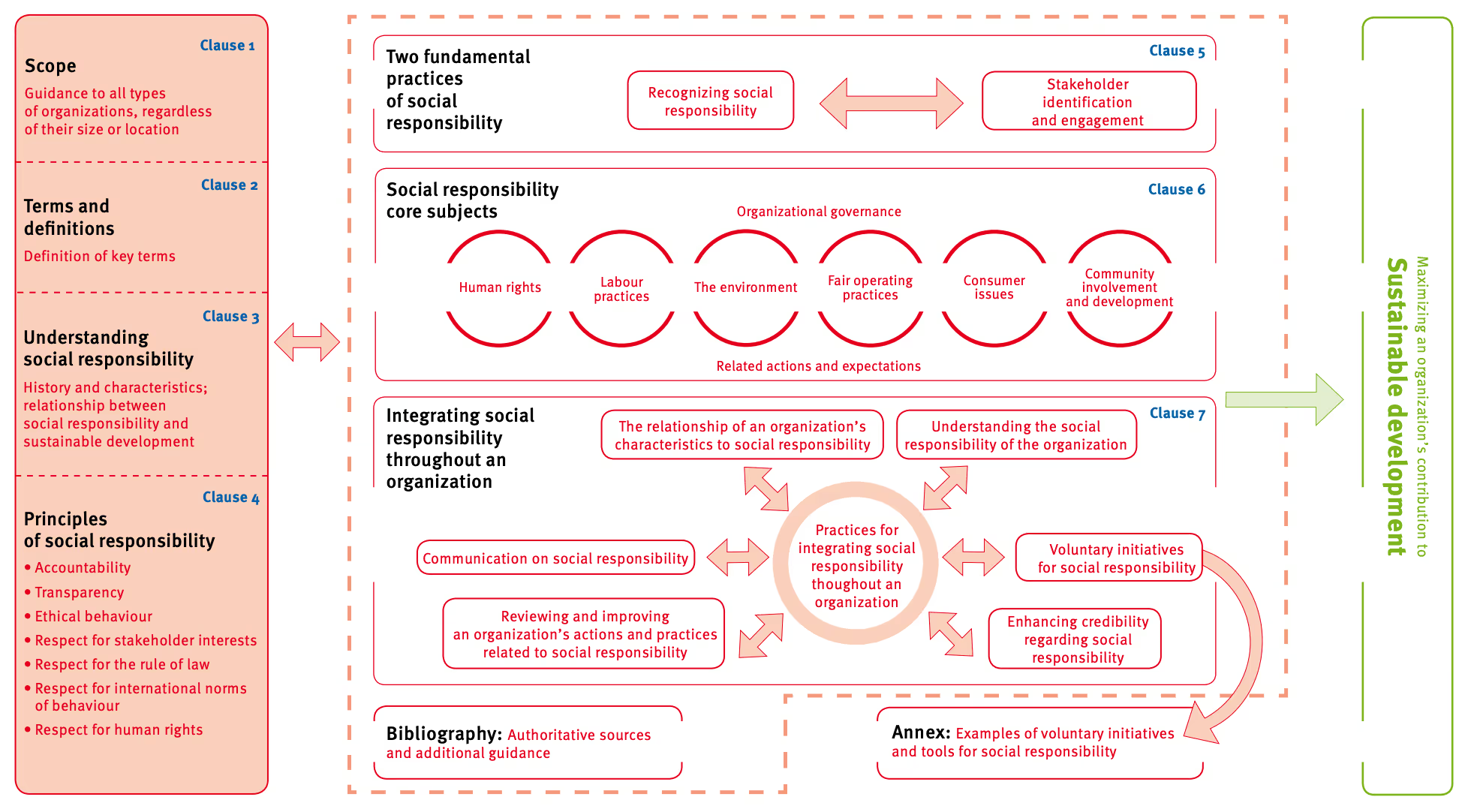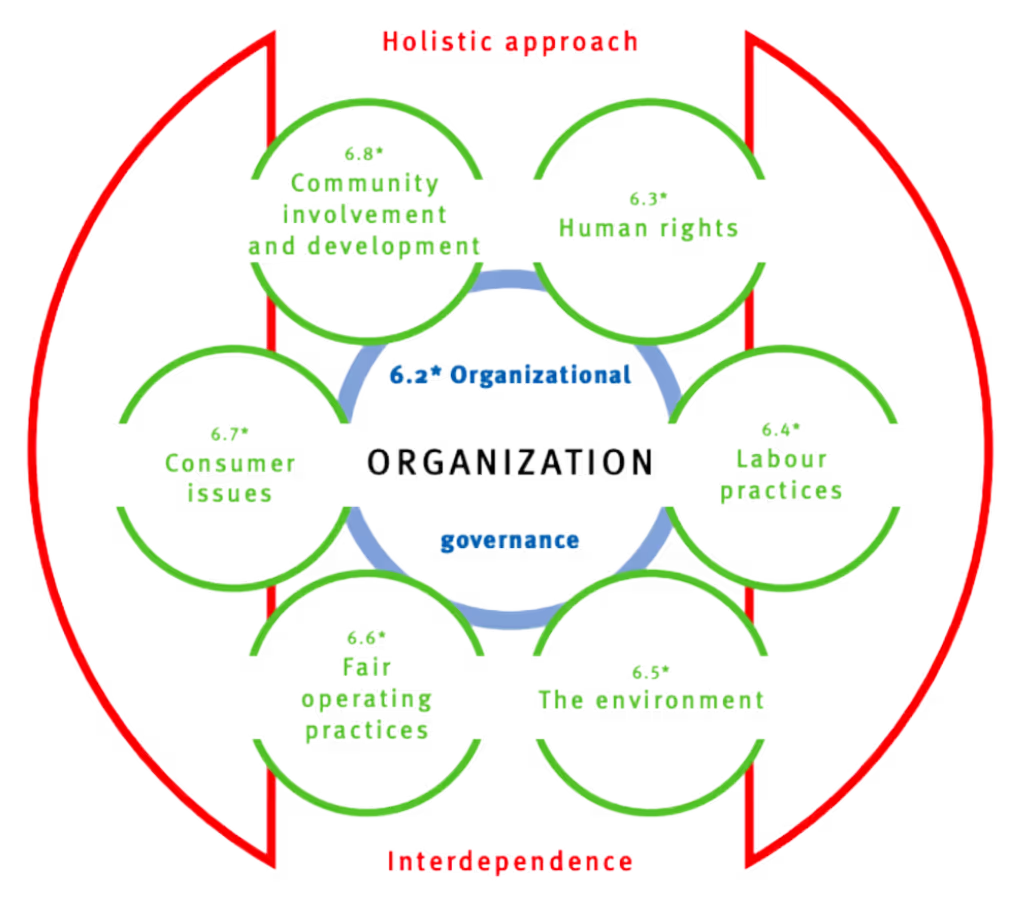Ever wondered how your business can make a meaningful impact beyond profits? Climate change and sustainability are becoming front and centre topics, companies are expected to do more than just reduce their carbon footprints—they need to show genuine commitment to ethical practices.
Sustainability isn't about ticking boxes; it's about future-proofing your business, building trust with customers, and staying competitive in an eco-conscious market. ISO 26000 offers valuable guidance on integrating social responsibility into your strategy. Let's delve into what ISO 26000 is and why it matters for your organisation.
What is ISO 26000?
ISO 26000 provides detailed guidelines for businesses to understand and embrace social responsibility through detailed guidelines. Unlike other ISO standards, it is not designed for certification.
Published in 2010 after years of collaboration between experts from governments, NGOs, industry, and consumer groups worldwide, ISO 26000 covers a wide range of topics, from fair labour practices to environmental sustainability.
In practice, it’s not a one-size-fits-all approach because whether you’re running a small business or a large corporation, the standard will give you a flexible framework to make a positive difference with your sustainability efforts.

Source: ISO
Why is corporate social responsibility important?
Corporate social responsibility (CSR) has become more critical than ever. Despite being studied and evaluated regarding their financial performance, companies are now being judged on their commitment to the well-being of society and the environment.
In other words, CSR is about businesses taking responsibility for their impact on the world. This can include promoting fair labour practices or reducing their general environmental footprint.
So, ISO 26000 aims to:
- Assist organisations in addressing social responsibilities while respecting cultural, legal, and economic differences;
- Provide practical guidance to make social responsibility an integral part of operations;
- Help companies engage with stakeholders and improve the credibility of their social responsibility claims;
- Focus on improving performance and demonstrating tangible results;
- Build trust and satisfaction among customers and other stakeholders;
- Promote consistency with international treaties, conventions, and existing ISO standards;
- Broaden awareness and understanding of social responsibility across industries.
Is ISO 26000 a certification?
No, ISO 26000 is not a certification standard. Unlike other ISO standards that companies can be certified against, ISO 26000 doesn’t include specific requirements or criteria for certification.
ISO 26000 is only a guidance tool to help organisations understand and implement socially responsible practices. Any offer to certify a company against ISO 26000, or any claims of being certified to this standard, would misrepresent its true purpose.
That said, ISO 26000 can still be a precious resource for businesses looking to improve their social responsibility efforts.
The seven core subjects of ISO 26000

Source: ISO
ISO 26000 underlines seven core subjects to guide companies' social responsibility efforts. Here’s a brief overview:
- Organisational governance: It’s about how a company is directed and controlled, focusing on ethical decision-making, accountability, and transparency;
- Human rights: Organisations need to respect and promote human rights throughout their operations, from fair treatment of employees to supporting human rights in the supply chain;
- Labour practices: This subject covers issues such as fair wages, safe working conditions, and equality in the workplace;
- Environment: Companies must minimise their environmental footprint and reduce emissions by implementing sustainable practices in their general business strategy;
- Fair operating practices: The goal here is to promote ethical conduct in business, including anti-corruption measures, fair competition, and responsible supply chain management;
- Consumer issues: Ensuring product safety, transparency, and fair treatment of consumers is another priority;
- Community involvement and development: As a final requirement, businesses must contribute more and in a better way to the social and economic development of the communities in which they operate.
Top benefits of adopting ISO 26000
Looking to elevate your business in more ways than one? Adopting ISO 26000 can be a catalyst for transformative growth. From gaining a competitive edge to enhancing your reputation and attracting top talent, integrating this social responsibility standard can significantly impact your organisation's success. Let's explore the top advantages of embracing ISO 26000.
Competitive advantage
First advantage: adopting ISO 26000 gives your business a clear market edge. If your company demonstrates its commitment to social responsibility, you can stand out from competitors, especially if ethical practices are highly valued in your industry.
Better company reputation
Implementing ISO 26000 can significantly boost your company's reputation because it allows you to prove that you care about more than just profits. In other words, your company will build trust in customers, stakeholders, and the wider public.
Improved relationships with investors, donors and sponsors
ISO 26000 also strengthens your relationships with investors, donors, and sponsors, who focus more on supporting businesses prioritising sustainability and ethical practices. Sustainability makes your company more attractive for partnerships and funding opportunities, which is a mighty lever.
Ability to attract and retain employees, users and investors
You need to know that a strong focus on social responsibility attracts talent, customers, and investors who align with your values. This is precisely where ISO 26000 is applicable. It shows that your company is forward-thinking and ethical, making retaining dedicated employees and loyal customers easier.
Increased customer loyalty
Customers are likelier to stay loyal to businesses that reflect their ethical values. Thanks to ISO 26000, you can prove that your company is committed to positive social and environmental impact and build deeper customer connections, which is a win-win situation.
Maintenance of employee productivity and happiness at work
A socially responsible work environment fosters higher employee morale and productivity. ISO 26000 creates a workplace where employees feel proud of their company, leading to greater job satisfaction and happiness.
Access to new markets and opportunities
Last but not most minor advantage: ISO 26000 opens doors to new markets and business opportunities. Keep in mind that more and more industries and governments prefer to work with companies that meet high ethical standards.
How do you implement ISO 26000 in your organisation?
Here’s a step-by-step guide to implementing ISO 26000 in your organisation:
- Understand the main principles: Begin by familiarising yourself with the core principles of social responsibility and how they relate to your business because this will set a real foundation for future responsible practices;
- Identify your responsibilities: Next, you must determine your company’s social duties within its sphere of influence, for example, regarding the way the company’s actions and operations impact society, the environment, and even key stakeholders;
- Do not hesitate to involve your stakeholders: Even if this may not be your first idea, this means that you can actively involve your employees, customers and suppliers to understand better their concerns and expectations and then shape your strategy more efficiently;
- Integrate social responsibility in your company’s policies: Make it part of your organisational culture so it’s reflected in everything you do;
- Build internal competency: How? Simply by training your teams and equipping themwith the proper knowledge and tools to practise social responsibility through pertinent actions;
- Communicate about your efforts in general: Transparent and regular communication is vital, which means that your company needs to share its social responsibility initiatives both internally and externally regularly;
- Remember to monitor and review your social responsibility practices. The idea is to make the required adjustments to align with your goals and society's evolving needs.
Start your sustainability journey with Plan A’s carbon management platform. Measure and reduce your emissions to comply with international standards like ISO 26000. Book a demo.







.avif)
